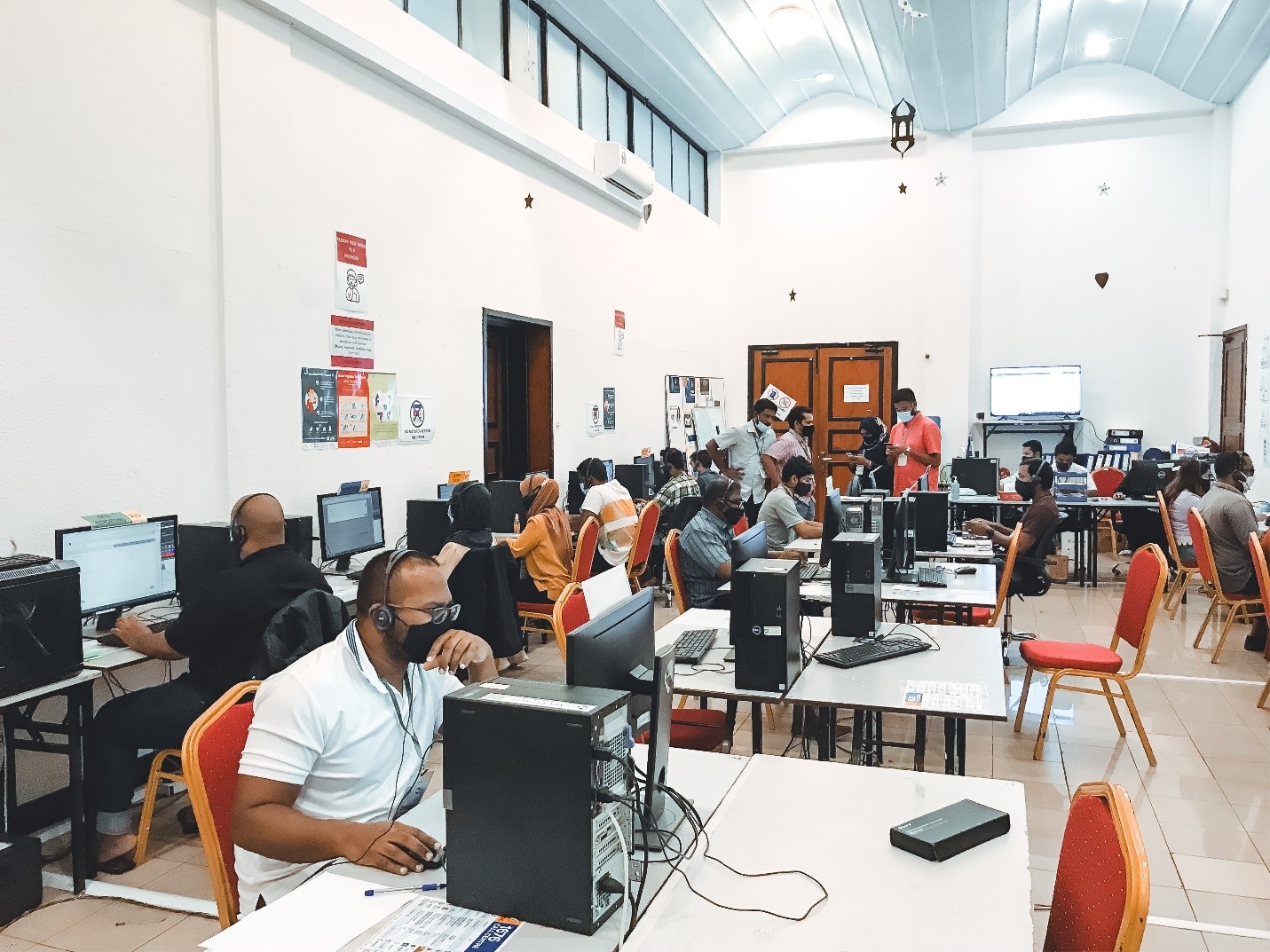Male, Maldives – “The one sound that continued to echo in the building was the sound of the dedicated employees of the call center, who tirelessly carried on answering the string of non stop calls that came on coming through the hotline. The only thing that could be observed was how swiftly they answered the calls, one after the other.”
“They didn’t notice that a group of outsiders were present in their office, despite us having have been there for a long time. Every single person was solely focused on the task at hand, while sitting at their desks which were all lined up across the room.”
This is what was observed by a group of journalists, who visited the Covid-19 call center, stationed at the second floor of Dharubaaruge. They explained their initial reaction to the environment as “bizzare”.
Huge responsibility taken on by a small team
The Covid-19 hotline was established in the Maldives on the 7th of March, as a means of clarifying information regarding the virus and the decisions made with regards to the virus, for the public, as well as a medium of reporting any symptoms.
Since the day of the toll free number, 1676 getting inaugurated, the one complaint that never ends is about the delays faced by the public with regards to the work of the call center. And the fact that phone calls go unattended. There never seems to be a day where someone doesn’t pour their hearts out, describing the dilemmas they have had to go through while dealing with the hotline representatives.
However, what we don’t see, is the amount of hard work and hours of service provided by the call center representatives, who start their shifts at 08:00 in the morning, which often ends at 01:00 well past mid night.
Incharge of the call center, Abdullah Azmeen revealed that the work of the call center is split into four shifts, at which each shift, are 10-15 operators and 2 supervisors. He went on to add that while an average of 2,000 calls are received by the center, each operator is expected to answer a minimum of 100 calls during their shift.
“Unattended calls will be returned. Unreturned calls will be attended to the following day.” Azmeen explained.
Azmeen also highlighted that the job is not always easy, as angry callers sometimes vent to the phone operators, who patiently listen to the frustrations, despite the toll it takes on themselves. “Even in such calls we make a point to hear out what people have to say. But we don’t have the luxury to listen to callers communicate with vulgar words for 20-30 minutes at a time.” Azmeen said.
Another point Azmeen shed light on is that although at times, unfortunately, some people misuse the Covid hotline, such as using the emergency section for non emergency matters, which would delay the response time for someone who actually needs emergency attention. He also added that sometimes, some calls have been made to the call center which are non Covid-19 related. Azmeen requests all such calls to be directed to the relevant institutions for the most effective response.
Organization and team work, backbone of hotline operation
An operation of national magnitude, surely would require organization and delegation in the most effective and efficient form. One thing the group of journalists who visited the facility highlighted, is that briefing and debriefing meetings were held at the beginning and end of each shift. During this meeting, all regulations and important points to be highlighted with regards to the operation are briefly looked at, specially to the areas in which any changes have been brought about.
One of the supervisors at the call center, Bishara Adam said that each briefing highlights what has to be improved, based on the events of the day as well as the handing over of work after each shift, along with the allocation of new operators to each station.
Bishara revealed that most calls to the center are made regarding domestic travel, which includes getting the appropriate documentation and approvals. The second most number of calls are concerning becoming symptomatic, or coming into contact with an infected person.
A job to be taken with a grain of salt
While no call center job can be easy, having to deal with frustrated callers during a global pandemic will surely be no walk in the park. Spending more than eight hours per day, answering an average of 100 calls on any given shift, any operator is surely bound to get connected to a caller who may have an earful to give to the authorities.
According to call center staff Ibrahim Madheen, the biggest struggle is being helpless to assist callers further to ease their struggles, despite feeling extremely sorry. He said that all they can do is provide the most accurate information regarding the matter, as much as possible.
Another employee of the facility noted that the toughest part of the job is dealing with callers who are disrespectful and use inappropriate language towards the operators.
While it is understandable that many may have complaints and frustrations, given the restrictions put in place and the lack of availability in services, we, as a community must try our best to be kind to one another in filing complaints and taking matters to higher ups. We must understand that the call operators too are human, with real feelings, who are working hours on end to solve our issues for us.
Together, we can beat this.





